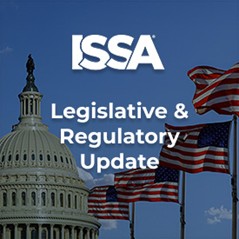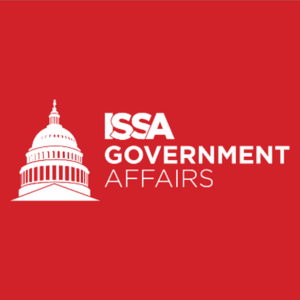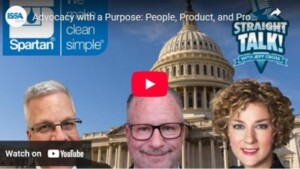ISSA Leg. & Reg. Update – Your Feedback Requested!
 Welcome to the latest ISSA Legislative & Regulatory Update, a biweekly roundup of the public-policy issues currently impacting the full cleaning supply chain. This update touches on the 2025 ISSA Advocacy Survey, ISSA’s updated EPR Guidance, the latest Straight Talk featuring Rebecca Kaufold and Keith Schneringer, and more.
Welcome to the latest ISSA Legislative & Regulatory Update, a biweekly roundup of the public-policy issues currently impacting the full cleaning supply chain. This update touches on the 2025 ISSA Advocacy Survey, ISSA’s updated EPR Guidance, the latest Straight Talk featuring Rebecca Kaufold and Keith Schneringer, and more.
Want to stay informed about critical government affairs impacting the cleaning and facility-solutions industry? Sign up here to have the ISSA Legislative & Regulatory Update emailed directly to you every other week.
ISSA Advocacy

Help Shape ISSA Government Affairs – Take Our 2025 ISSA Advocacy Survey
What it means: ISSA continues to build and strengthen our Government Affairs Department so that we can best represent the interests of our members before federal and state policymakers.
Why it matters: Your responses to this biannual ISSA Advocacy Survey will help us gauge members’ interest in our advocacy efforts, as well as help guide and shape those efforts moving forward.
What ISSA and you are doing: Those who complete the brief survey will be entered to win a US$100 gift card! Take the survey now
ISSA Strengthens EPR Guidance with MD, WA Additions
What it means: The landscape of waste management and recycling is undergoing a significant transformation across the United States, driven by the increasing adoption of Extended Producer Responsibility (EPR) legislation. ISSA announces a crucial update to our comprehensive EPR Guidance document, which now includes detailed information about Maryland and Washington State.
Why it matters: EPR is a policy approach that shifts the financial and operational responsibilities for the end-of-life management of products, particularly packaging, from municipalities and consumers to the producers themselves. This paradigm shift aims to incentivize more sustainable product design, improve recycling rates, and create a more circular economy. With Maryland and Washington State recently enacting their own EPR laws, they join California, Colorado, Maine, Minnesota, and Oregon in leading this national movement.
What ISSA is doing: The recent additions to ISSA’s guidance reflect our commitment to equipping our members with the most current and relevant information to thrive in an increasingly regulated cleaning industry. By providing clear insights into these complex regulations, ISSA helps businesses proactively adapt their packaging strategies, supply chains, and overall sustainability performance. Learn more
Time is running out–register now for the August 19 ISSA webinar The Sustainable Sweep: EPR, Circularity, and the Future of the Cleaning Industry.

Advocacy with a Purpose: People, Product, & Proper Training
What it means: What do “people, product, and proper training” have to do with advancing the cleaning industry? Everything.
In this episode of Straight Talk, ISSA Media Director Jeff Cross sits down with two government advocacy experts in the cleaning industry, Rebecca Kaufold of Spartan Chemical Company and Keith Schneringer of BradyPlus, to break down the 3 Ps of effective advocacy—and why they matter now more than ever for professionals in the cleaning, facility services, and environmental health sectors.
Why it matters: You’ll learn what manufacturers, distributors, and ISSA are doing to shape legislation and regulations to keep workers safe and allow the industry to thrive.
What ISSA is doing: ISSA applies these advocacy principles to the public-policy issues that matter most to our industry, like chemical regulations, workforce development, and sustainability goals. Learn more about this and how you can get involved
Additional Updates
Regulatory & Judicial
Trump Signs China Tariff Extension
President Trump signed an executive order extending the tariff truce between the US and China for another 90 days, pushing trade negotiations out to the fall. Trump’s latest sweeping “reciprocal” tariffs hit dozens of US trade partners last week. Learn more (Yahoo Finance)
Trump Suspends Exemption for Low-Value Imports
President Trump is ending an exemption that allowed certain low-value commercial shipments into the United States without facing tariffs. Trump signed an executive order that will end the so-called de minimis exemption effective August 29. As of that date, imported goods that are valued at US$800 or less and shipped via means other than the international postal network will be subject to duties. Learn more (The Hill)
Lawsuit Could ‘Throw a Wrench’ in Trump Trade Policy
The Trump administration’s trade policy faces a critical test as a federal court considers the legality of its sweeping tariffs. The U.S. Court of Appeals for the Federal Circuit in Washington, DC, heard oral arguments late last month on VOS Selections v. Trump, a case brought by five small business owners and 12 states that allege that they have been harmed by President Trump’s import taxes. The lawsuit challenges the President’s claim that he has authority under the International Emergency Economic Powers Act of 1977 to issue tariffs, a process that normally requires congressional approval. The case is likely to ultimately be decided by the U.S. Supreme Court. Learn more (CBS News)
Troutman Picked to Helm EPA Chemicals Office
President Trump nominated American Cleaning Institute’s Interim Co-CEO Douglas Troutman to be the Assistant Administrator of the U.S. Environmental Protection Agency’s (EPA) chemicals office. If confirmed by the Senate, Troutman would take the helm of the agency’s Office of Chemical Safety and Pollution Prevention, which regulates pesticides and chemical uses. Learn more (Politico)
Legislative
Warehouse Worker Protection Act Reintroduced
On July 31, Senators Markey (D-MA), Smith (D-MN), and Hawley (R-MO) and Representatives Norcross (D-NJ-01), Lawler (R-NY-17), and Stevens (D-MI-11) reintroduced the Warehouse Worker Protection Act. According to the Coalition for Workplace Safety (CWS), the legislation would “impact workplaces across the economy and in nearly every industry. It prohibits the use of valuable workplace metrics that help keep workers safe and businesses operating effectively. It also forces the Occupational Safety and Health Administration to implement an unworkable ergonomics rule.” Learn more (CWS)
Congress Braces for Shutdown Fight
Rifts are emerging between Republicans over how to approach next month’s government funding fight, with some pushing for leaders to try to pass new full-year spending plans and others expressing openness to another funding patch if it means less spending. When lawmakers return from their month-long recess in September, they’ll have just weeks before an end-of-month deadline to keep the government funded or risk a shutdown. Learn more (The Hill)
State News
California Minimum Wage to Increase in 2026
California officials announced that the statewide minimum wage will increase for all employers to US$16.90 on January 1, 2026, as required by the state’s annual inflation-based adjustment process. The Department of Finance certified the applicable Consumer Price Index increase, triggering an impending rise in the statewide minimum wage for all businesses, regardless of size. Learn more (JD Supra)
Wholesalers Sue Oregon over EPR Law
The US$8 trillion wholesale product distribution industry is challenging a four-year-old Oregon recycling law weeks after the law took effect. The Plastic Pollution and Recycling Modernization Act, passed by the state legislature in 2021, was meant to create statewide standards for what can and cannot be recycled and established new packaging fees for companies that sell products in Oregon. The fees, based on the weight and recyclability of the material, are meant to require product manufacturers and distributors to cover some of the end-of-life costs for disposing of their packaging—costs that are currently borne by the businesses and Oregonians who pay for the garbage.
On July 30, about three weeks after the law was implemented and manufacturers received their first bills, the National Association of Wholesaler-Distributors sued the state in U.S. District Court in Portland to stop it from continuing, claiming the law is unconstitutional. Learn more (Washington State Standard)














